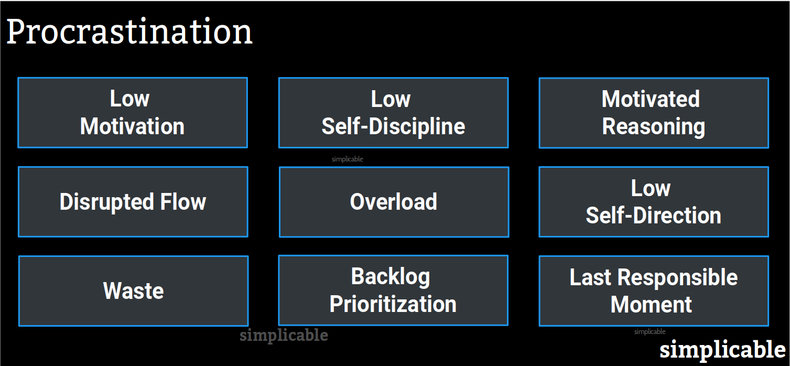

Low Motivation
Procrastination typically only occurs for tasks where an individual feels low motivation. This can be due to the nature of the task itself. For example, a manager who puts off a difficult conversation with a team member because its an unpleasant task.Low Self-Discipline
Self-discipline is the ability to behave in a directed and controlled way even if you aren't feeling particularly motivated. Low self-discipline is likely to cause procrastination as an individual fails to direct their efforts into what they know needs to be done.Motivated Reasoning
Motivated reasoning is the process of using logic to explain what you want to believe. Using this mode of thinking to rationalize delays is a common form of procrastination. For example, the argument that you should watch some television to relax before starting your homework because you will be more productive and focused if you're relaxed. This may be rational in a way but is likely motivated by a desire to avoid your homework.Disrupted Flow
The disruption of flow due to poor practices such as multitasking and character traits such as distractability. For example, a student who begins an essay by heading to a video streaming site for some background music who ends up spending significant time watching videos.Overload
Individuals who push themselves too hard such that they fail to recognize their limits. For example, a student who expects that they can party 5 nights a week, get little sleep and still perform at a high academic level.Low Self-Direction
Individuals who require others to push them to complete tasks. This can be due to habits. For example, an individual who has always been pushed by parents to complete homework who is suddenly on their own at college.Waste
Time is a fixed resource. In some cases, procrastination results from all of the things that you are doing with your time that don't accomplish much. For example, the habit of checking the news in the morning when you arrive at work and then checking it again after lunch.Backlog Prioritization
Individuals may have a large number of things that they want to accomplish that they place on a backlog. Items that are prioritized get completed and items that are never prioritized continue to sit on the backlog where they may eventually expire. This is actually a reasonable way to work in many cases but it feels like procrastination when there is something that should be prioritized that you defer, often due to motivation. For example, a hard worker who knows they should call their elderly parents who puts this off week after week such that they begin to quite feel guilty. In this context, it makes sense to prioritize the things that are causing you to have negative feelings about how you are using your time.Last Responsible Moment
Last responsible moment is the strategy of delaying tasks until they absolutely need to be done. This can be described as rational procrastination. Doing things at the last moment can have several advantages including the following.Cramming for tests can be efficient as it is easy to remember something you have just learned. | Imminent deadlines help to prevent perfectionism. |
Imminent deadlines may serve as motivation. | Minimizing the risk that the task will be canceled or that things will change that invalidate early work. |
Provides an excuse to avoid more work i.e. avoids situation where you are assigned more work because you completed something early. | Provides the maximum time to think through the task before beginning. |






























